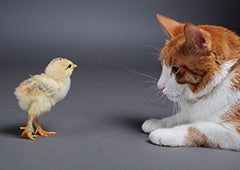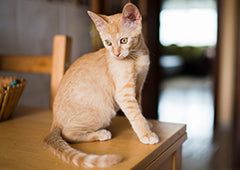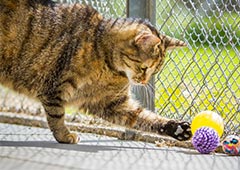Thinking of adding a feline friend to the household? Cats are very affectionate, beautiful creatures that you just can’t help but fall in love with. Who wouldn't want an adorable furry friend who loves to be your house companion! However, finding the perfect cat involves more than going to the sheter and choosing the cutest, friendliest kitty you find (tempting as it may be!). When you bring that cat home, you may discover it’s not as perfect as you thought!
Before you choose your cat, you need to consider a few factors about your environment. This will help you choose a breed of cat that with mesh well with your lifestyle, rather than one who struggles. It’ll make both your lives easier, and mean you won't be faced of the prospect of putting this innocent creature up for adoption!
So, let’s start off with the first factor you should consider - the age of your cat. It matters more than you might realise!
1. What age cat is right for me?
It’s always tempting to go straight for an adorable, tiny, fuzzy kitten - but you should only get a young cat if you’ve got the time to nurture and train them. Kittens are a handful - they may be small, but they are bouncing balls of energy that haven't learned the skills to stay out of trouble! So, they need to be closely monitored as they’re growing and developing.
With a grown cat, you essentially know what kind of cat they're going to be from the outset. Their personality has already developed, they are more laid back and danger-savvy, and most have been microchipped, vaccinated and desexed - something your kitten may not yet be.
2. How often are you home?
Work full time or are out of the house often? You’ll want a cat that doesn’t mind relaxing on its own during the day, and doesn’t crave attention from their owner frequently. Otherwise, your cat will be miserable - and we don't want an unhappy life for our furry friends!
If you will be around your cat often, and can give it all the snuggles and scratches it requires, then by all means an affectionate cat breed will be such a joy! Affectionate cat breeds that need attention include:
-
Manx
-
Burmese
-
Persian
Cats that can tolerate being alone during the day (but will happily greet you with purrs and cuddles when you get home) include:
-
Exotic shorthair
-
Russian Blue
-
Javanese
Getting a cat that can cope with your absence during the day is important - cats that need constant affection and can't get from their owners frequently will be frustrated, cranky and whinge without it. That’s not something you want to come home to!
3. Will it be an inside or outside cat?
Most cats are kept as inside animals. However, if you are looking at getting a cat that will spend some of its time outdoors, it will need a safe and secure enclosure to keep it from straying, and also to sleep in. The Paws Parlour, Kitty Kastle and Purrfect Palace are all great options to let your cat enjoy the outdoors without being at risk.
If you don’t want your cat to sleep in random nooks and crannies of the house, getting them a cat enclosure is a good idea regardless - it gives you peace of mind that they haven’t slipped out of the house whilst you're fast asleep, and keeps them comfortable.
4. Do you have children?
Despite their best intentions, children can be a little rough when showing their affection to their animal friends. A young child can often grab a cats tail or fur out of curiosity, or perhaps might squeeze them a bit too tightly when giving them a big bear hug. Therefore, you’re going to need to find a cat that’s got a calm demeanor, and won’t react with annoyance and negative behaviour to being handled regularly. (All interactions between a cat and a young child should be supervised regardless, just in case!)
5. Do I already have any pets?
Have you already started your animal family? If you’ve already got a cat, dog or other domesticated animals, you need to consider feline breeds that get along with other pets. Some are happy to share their attention and space, others are not so generous and prefer to lap up all the attention!
Here are some cat breeds that get along well with other animals:
-
American Shorthair
The American Shorthair is a fun, playful breed that’s happy to share their space with a fellow animal friend. They’re also confident, and not afraid to stand up to another pet if they’re being pushed around (don’t worry, this is usually in the form of a quick hiss or spray - not a swipe!)
-
Siberian
This cat is as playful as it is fluffy! The Siberian loves to roam around the house and explore - plus their size means they won’t get pushed around by any overly inquisitive dogs or other cats. The animals will bond so well they may start exploring together.
-
Maine Coon
A beautiful, laid back breed that will get along fabulously with other pets. Again, it’s quite a large breed, so it can stand its ground if it feels uncomfortable, or the dog is being a bit too boisterous.
6. What about adoption?
Don’t think the pet shop is your only option for finding the right cat for you. You can always adopt a cat from a rescue shelter that needs a new home. It’s incredibly gratifying, and most of the animals are usually microchipped, vaccinated and desexed. Most shelters have kittens and cats, and the staff can tell you all about the animals personality, so you can make sure the cat is a good fit for your lifestyle. Adopting a cat is a lovely gesture that gives you a great friend for life.
So, as you can see choosing the perfect cat is more than picking the cutest kitten! Do a little research, so you know when you bring your furry friend home, that they are going to fit into family life purrrfectly!
Again, if you want to keep your cat outdoors, they need a safe enclosure that won’t let them roam away. Check out our range of comfortable, sturdy cat enclosures - the perfect fit for your new furry friend!



















